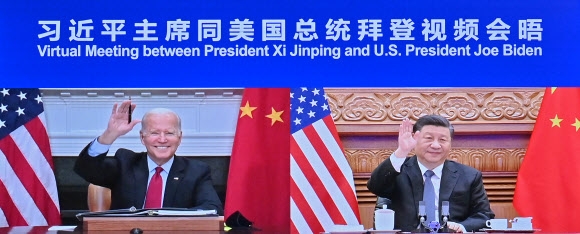
Biden and Xi Failed To Restore Relations Despite Concluding the Taiwan Conflict
(South Korea) on 17 November 2021
by Editorial (link to original)
Ten months after Biden took office, the two leaders engaged in a fierce battle over several issues including diplomatic relations, security, trade and human rights, for an hour and 34 minutes, excluding breaks. While the leaders agreed with the principle of "one China" over the biggest issue of Taiwan, they continued to engage in a tense war of nerves.
Biden made it clear that the U.S. strongly opposes unilateral actions that undermine peace and stability in the Taiwan Strait, promising to maintain a "one China" policy on the issue of Taiwan, a key conflict. In response, Xi warned, "If Taiwan’s independence and divisive forces provoke and even break through the red line, we will inevitably take decisive measures. This suggested that unification by force is possible depending on the attitude Taiwan assumes. Both leaders tried for harmony in their remarks, but they failed to hide the nature of their rivalry for hegemony.
Most of the agenda for the meeting was exchanged without agreement or any joint declaration. Unfortunately, the U.S. accepted the Chinese policy and promised not to engage in conflict with China, but the U.S. showed its limits when it failed to strike any breakthrough in restoring U.S.-China relations.
The U.S.-China summit fended off conflict and prevented catastrophe in Taiwan because under the current circumstances, the countries need to work out complex domestic economic and political problems first. China has not abandoned its dream of becoming the world's strongest country, the "Chinese dream," and the U.S. is also maintaining a policy that regards China as its main enemy. Consequently, the U.S. and China failed to find a clear solution to other pending issues such as Hong Kong, Xinjiang Uighur human rights, and the South China Sea, as well as the problem with the strategic supply chain, which is an extension of trade conflict.
The international situation is a perfect storm in which uncertainties are intersecting. Although the U.S. and China seem to sympathize with preventing a military clash, competition for hegemony is likely to intensify on pending issues involving raw materials, intermediate goods, information technology, finance, food and space. Experts take the current situation so seriously that they believe U.S.-China hostility has grown thanks to the development of advanced artificial intelligence weapons being used in such traditional areas as diplomatic relations, security and the economy. Experts claim the situation has reached a point that recalls the eve of World War I.
Korea's core national interests depend on security and economy. Only when an open international order is established to protect democratic values will the national interest, which is highly dependent on foreign trade, be guaranteed. For South Korea, which relies on the U.S. and China for its security and economy, a diplomatic strategy to pursue practical interests is more urgent than ever, one which should create a buffer zone for conflicts between the two countries and expand the space for security and economic activity.

:quality(70)/cloudfront-eu-central-1.images.arcpublishing.com/thenational/VDLQQ7MSLEEID7NTX5IYLSX6RU.jpg)